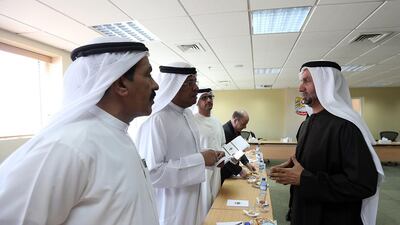The real value of the Federal National Council emerges at times when a law has to catch up with the changing values and priorities of Emirati society. By having a mix of elected and appointed representatives from across the country, the FNC reflects the breadth of Emirati life, which is why it is the perfect forum to begin discussions about proposed laws on domestic abuse.
Every society suffers from domestic abuse and the UAE is no different. However, increasing numbers of incidents are being reported because more people in this country are choosing to speak up against it. The laws governing domestic abuse need to be updated to reflect these evolving attitudes.
As The National reported yesterday, FNC members have called for a law that can deal with domestic abuse in all its forms, including physical, sexual and psychological abuse. Ghaneema Al Bahari, the director of care and rehabilitation at the Dubai Foundation for Women and Children, said such a law would give the foundation the teeth it needs to deal with abusive family members.
But this discussion will involve a delicate balancing act. Domestic abuse is a difficult subject because there is no consensus on what it can involve and what the limits should be on the sanctity of the family home. For example, when does it become more than just a family affair that warrants official intervention? What specific forms of abuse should be made punishable by law? Would neglect, for example, be considered an offence that calls for prosecution? Where should the line be drawn between family discipline and abuse?
There is a clear need to challenge some traditional ideas and practices within the home that no longer suit modern Emirati society. The victims of domestic abuse in the UAE are usually women, with 507 of the 840 cases of domestic abuse in Abu Dhabi in 2013 involving abuse from husbands. These cases involved not just physical attacks but also verbal insults and threats. Unfortunately, these are sometimes ignored in Emirati society or even tolerated as a legitimate form of discipline.
This balancing act will require wisdom and also keen awareness of Emirati values, but the reward will be to have ended confusion about what is and is not acceptable behaviour. From this, a legal framework will address all forms of domestic abuse, shedding light on a pressing issue that for too long has remained in the shadows.

